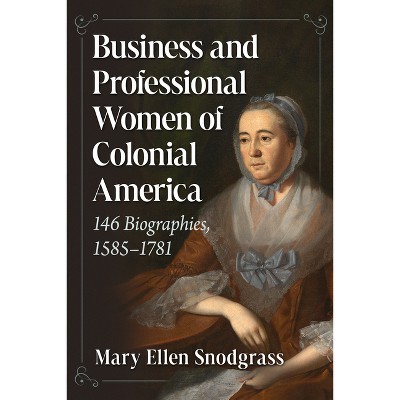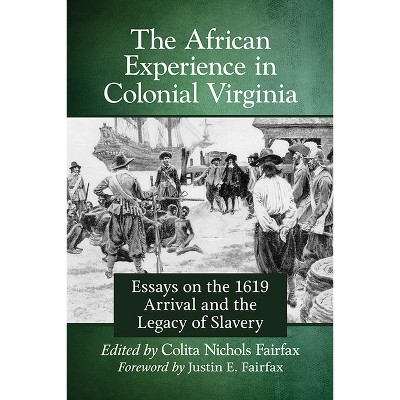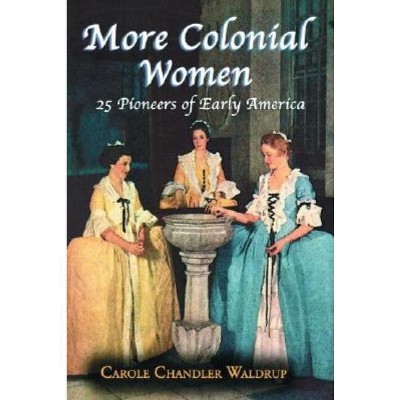Sponsored

The Mystic Nuns of Colonial Colombia - by RoseAnna Mueller (Paperback)
In Stock
Sponsored
About this item
Highlights
- This work explores the religious experiences of five cloistered nuns in Bogota and Tunja, New Granada (present day Colombia), during the 17th and 18th centuries.
- About the Author: RoseAnna Mueller is professor emeritus of humanities at Columbia College Chicago.
- 205 Pages
- Religion + Beliefs, Christianity
Description
About the Book
""This work explores the religious experiences of five cloistered nuns in Bogotâa and Tunja, New Granada (present day Colombia), during the 17th and 18th centuries. Nuns played an important part in a multiethnic colonial society where convents were sites of financial and political power. Their writing inspired their religious communities and lay citizens, and exhibited clear influence of art, music and literature. Included here are the first English translations of several texts and the literary criticism of Colombian scholars. The spiritual biographies of Johanna de San Esteban and Marâia Gertrudis de Santa Inâes, considered to be models of piety, were written by their confessors. Francisca Josefa de Castillo y Guevara (Madre Castillo) and Jerâonima Nava y Saavedra, as consecrated brides of Christ, wrote about their relationship with Jesus in their own words. Marâia de Jesâus, a white veiled sister, was ordered to write by her confessor. This book includes the first English translations of several texts and the literary criticism of Colombian scholars."-Provided by publisher"--Book Synopsis
This work explores the religious experiences of five cloistered nuns in Bogota and Tunja, New Granada (present day Colombia), during the 17th and 18th centuries. Nuns played an important part in a multiethnic colonial society where convents were sites of financial and political power. Their writing inspired their religious communities and lay citizens, and exhibited clear influence of art, music and literature.
Included here are the first English translations of several texts and the literary criticism of Colombian scholars. The spiritual biographies of Johanna de San Esteban and Maria Gertrudis de Santa Ines, considered to be models of piety, were written by their confessors. Francisca Josefa de Castillo y Guevara (Madre Castillo) and Jeronima Nava y Saavedra, as consecrated brides of Christ, wrote about their relationship with Jesus in their own words. Maria de Jesus, a white veiled sister, was ordered to write by her confessor. This book includes the first English translations of several texts and the literary criticism of Colombian scholars.
Review Quotes
"RoseAnna Mueller's The Mystic Nuns of Colonial Colombia offers a compelling window into a world where convent walls served as sanctuaries and stages for spiritual power in New Granada. Drawing on meticulous archival research, personal academic endeavors, and the voices of those within the cloisters, Mueller reconstructs a richly detailed narrative of colonial life, gender, and mysticism. ... Mueller excels in illustrating how the sensory environment of the convent-saturated with Baroque art, religious images, and carefully curated libraries-inspired ecstatic visions and intense spiritual experiences. ... Ultimately, The Mystic Nuns of Colonial Colombia is much more than a historical account. It is a thoughtful exploration of how women in early colonial society harnessed mysticism as a means of self-expression, resistance, and empowerment. Mueller's work invites modern readers to reflect on the enduring intersections of art, gender, and spirituality, resonating far beyond the confines of the colonial era."-Alexandra Alvarez Muro, Doctor of Philosophy, senior researcher at University of the Andes
"This tome takes the reader into the world of 17th and 18th century, colonialism in a land governed strictly and with rules benefitting some far more than others. ... Mueller takes the reader into this world to educate and elucidate the times, the culture, belief systems and specifically the women who conducted themselves as necessary governed by the social structure and expectations. It's not a casual read, but it's a surprisingly fascinating world. I looked for bias from the author yet instead found a dispassionate telling of the reality in that time and space. It was a book from which I learned much, and about a subject in which I did not expect to immerse myself. I felt like I was getting a secret 'behind the scenes' peek into this world of ritual, personal and social meaning, and with accessibility to enlighten and paradoxically remind us of the off-limits world of 17th and 18th-century clergy. ... Perhaps the most poignant observation is that the reading of the book may enhance understanding as the reader accompanies the nuns in uncharted territory that reveals, evolves and elevates spiritually and intellectually. The book inspired questions and the wish to pull back the curtain towards revelation about this truly remote lifestyle that is so unusual for the average life in today's society even while there are familiar processes we can recognize."-Jacqueline Roig, clinical psychologist clinical psychologist
About the Author
RoseAnna Mueller is professor emeritus of humanities at Columbia College Chicago.











